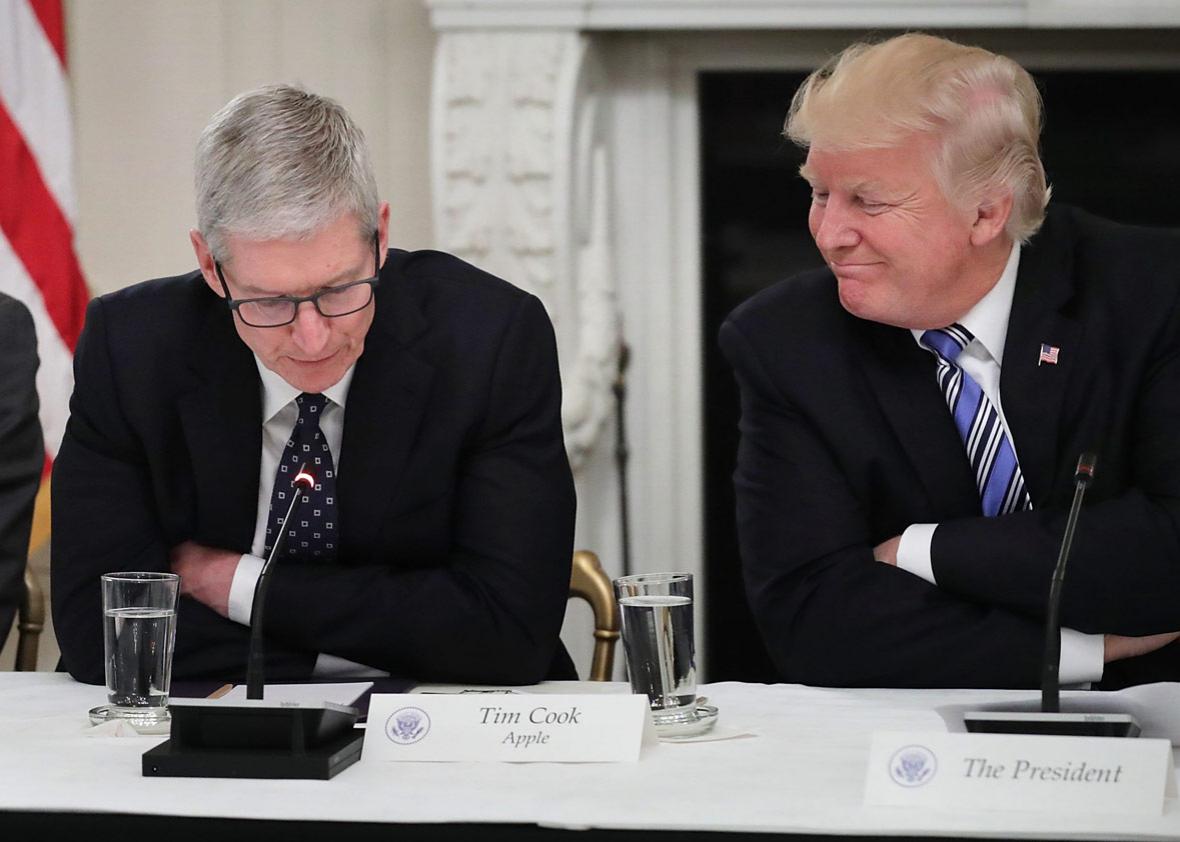On Tuesday, President Trump crowed in a Wall Street Journal interview that Apple CEO Tim Cook had committed to build “three big plants, beautiful plants” in the United States. The claim played perfectly into Trump’s protectionist, triumphalist economic agenda, suggesting both that he has some influence over Silicon Valley’s tech giants and that he is using said influence to bring manufacturing jobs back to America.
Apple has neither confirmed nor denied Trump’s statement, declining comment both to me and to all other media outlets that have asked. That’s not out of character for Apple, which is famous in the technology business for its fanatical secrecy. But in this instance, it comes across as cowardly—part of an embarrassing trend of major American corporations allowing a dishonest, self-serving political leader to speak for them.
For Trump, being able to take credit for Apple bringing high-tech manufacturing jobs back stateside amounts to a significant political coup. It sends the message that he’s making good on exactly the kind of hard-nosed, savvy deal-making on behalf of American workers that he promised on the campaign trail. The only way this could fail to help Trump would be if Apple were to publicly refute it in some way—which Apple has apparently opted not to do.
To those paying close attention, the fact that Apple has declined to confirm Trump’s statement suggests that it’s not true—or, at least, that it’s a mischaracterization. If Apple really were building three factories in the United States, that would amount to a radical change in its strategy. As New York’s Jake Swearingen points out, Apple doesn’t build factories anywhere: Instead, it contracts with manufacturers such as Taiwan’s Foxconn to build its devices.
Bloomberg is now reporting that Trump will announce Wednesday that Foxconn will build its first U.S. factory in southeastern Wisconsin. (Not coincidentally, that happens to be House Speaker Paul Ryan’s district.) It’s possible that is part of what Trump was referring to in the Wall Street Journal interview. But if so, it would make his statement both wildly inaccurate and deliberately misleading: A Taiwanese manufacturing giant with a reputation for shoddy working conditions building a factory in Wisconsin is very different than Apple itself doing so.
In a simpler time, when mainstream media were more broadly trusted, Apple’s refusal to confirm the president’s claim might backfire on him and undermine rather than bolster his credibility. But these days, liberals and conservatives largely have their own separate sources for news. By allowing Trump’s claim to go unchallenged, Apple is ensuring that half the country will be told only his side of the story. In essence, it’s handing him the political win while also permitting him to act as its de facto spokesman.
Why would Apple essentially cover for a Trump fib, if that’s in fact what this is? One possibility is that admitting that it isn’t building factories in the United States would draw attention to the reality that it has amassed enormous piles of wealth by contracting with relatively low-paid and poorly treated foreign workers to build shiny devices that it then sells at astronomical profits to American consumers. In that scenario, Apple is allowing Trump’s claim to stand because it prefers the lie to the truth.
A second possibility is that the company doesn’t want to run afoul of the president by publicly contradicting him. It would rather let Trump lie on its behalf in hopes of remaining in his good graces so that it can realize some future gains from that relationship, or at least avoid future retribution. If so, that’s more shameful still—particularly coming from a company that claims the moral high ground on issues such as gay rights in the same week that Trump announced a cruel, sudden ban on transgender people serving in the military. (Cook, on Wednesday, joined other Silicon Valley leaders in issuing statements that implied opposition to the ban, albeit obliquely.)
It’s also conceivable that Apple is simply adhering to its typical secretive approach and that declining comment is its way of not getting involved. But when the president announces major news about your company that also has major political ramifications, you don’t have a choice: You’re already involved, and a “no comment” speaks volumes about your priorities.
Finally, it’s theoretically possible that Apple really is planning to build three factories in the United States, unlikely as that seems. It has moved toward onshoring some manufacturing in recent years, and the increasing automation of factories makes that more affordable than it used to be. If that’s the case, shareholders will have a lot of questions about the move, as will the public—especially if it’s true that the move was made partly at Trump’s behest. But if what Trump said were accurate, why wouldn’t Apple simply confirm it?
Apple is not the first major American company to hand Trump a political win by allowing his claims about it to stand unchallenged. In January, Ford let Trump to claim credit for its decision to cancel a planned factory in Mexico and add jobs in Michigan instead. It was later revealed that the company had already planned the Michigan jobs as part of an agreement with its union. Then, in June, it let slip that it would simply expand production in China rather than Mexico. By that time, Trump had long since gotten what he wanted thanks to Ford’s shifty maneuvering. And Ford bought some cheap goodwill from a president who will gleefully torch his perceived enemies on Twitter. Even now, with our vindictive, unstable president’s approval ratings hovering at historically low levels, companies are afraid to make an enemy of him.
Apple is under no obligation to build factories in the United States or anywhere. But for a company that has begun to earn a reputation for social responsibility and courage under CEO Tim Cook, its silence on Trump’s claim is an ugly look.
